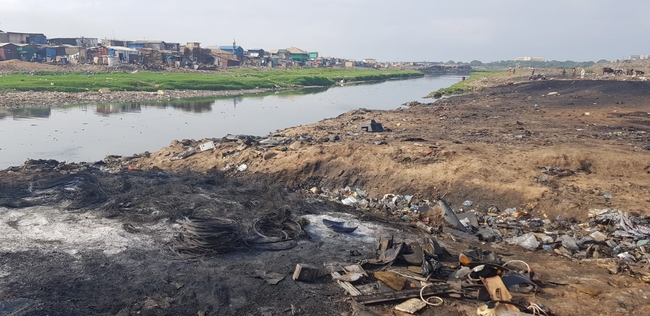Despite European ban on the export of electronic waste (e-waste) to non-EU (European Union) and non-OECD (Organisation for Economic Co-operation and Development) countries, each year, more than 350,000 tons of electronic waste are shipped illegally from the EU to developing countries. Large amounts of it go to Agbogbloshie in Accra, Ghana.
Thus, over the last 20 years, Agbogbloshie in Accra, Ghana, has become one of the largest dumping grounds for electronic waste in the world – leading it to become one of the most polluted places on Earth.
About 40,000 people live in Agbogbloshie. They engage in informal recycling, namely in unsafe practices including leaching and open burning to recover precious metals like gold, silver, and copper as well as components. Toxic substances including organic pollutants and heavy metals are thus released into the environment. Yet the actual state of pollution in soil, fresh water and the coastal waters, and how these pollutants get magnified along the food chain, are unknown.
The TAP project, involves a transdisciplinary team of international scientists and other stakeholders who will jointly assess e-waste pollution in the Agbogbloshie area, follow its pathways along the food chain and develop feasible actions to improve the environmental situation.
With this, the project also addresses the responsibility of European countries producing the e-waste that is deposited in Ghana.
Project Objectives:
1.To illustrate the impacts of extreme pollution on ecosystem structure
2. To map hot-spots and pathways of pollution in air, water, and soil in areas surrounding the dump site and develop suggestions for mitigation measures.
3. To assess potential health risk of trace metals in fishes from lagoon and coastal waters





